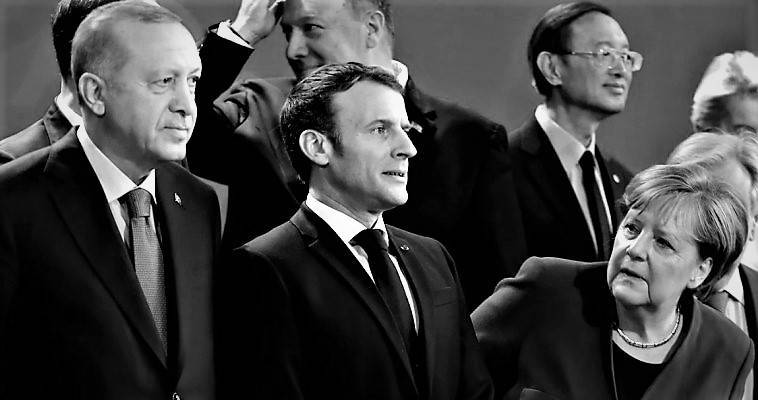Gerasimos Potamianos: Is the EU acquiring a geopolitical agenda, and is this an opportunity to suspend Turkey?
03/07/2020
The EU is obliged, within the framework of NATO, to fill the geopolitical vacuum in its neighborhood and to ensure strategic autonomy. The formation of a Greek geopolitical agenda, which sees beyond the Aegean, is becoming urgent. The new EU defense policy offers opportunities to suspend Turkey.
The European Commission, under Ursula von der Leyen, Angela Merkel’s protege, will be a “geopolitical” Commission. To improve the EU’s military might and therefore strengthen its diplomatic influence, von der Leyen is setting up a European Defense Fund and a Peacekeeping Facility for military action. The German presidency will give impetus to foreign policy – which includes relations with Africa and China – but also to strengthening civil defense. A Franco-German compromise has been reached, with the pillars of Germany’s economic strength and France’s military might.
Until now, Germany did not want to participate on the energy chessboard of the wider Mediterranean basin, through Cyprus and Greece. This choice was related to the presence of the United States, the NATO policy of equal distances, but also to the privileged relationship it maintains with Turkey. Today, after the reduction of the American presence, it will slowly but steadily turn to the Mediterranean, through Syria and Libya, in cooperation with France.
Macron made a well-calculated pirouette, saying “talks of building trust with President Putin continue, with reference to European security, regional conflicts and climate change.” The movement is the preamble of European geopolitical autonomy.
The Euro-Turkish dialogue
Following the visit of Presidents Michel and Ursula von der Leyen to Evros, Michel visited Ankara and Erdogan visited Brussels. The continuation of the Euro-Turkish dialogue has been agreed upon and the EU Representative for Foreign Affairs and Security Policy, Joseph Borel, is responsible for preparing the relevant file. Borel said that the EU is committed to protecting the sovereignty of Greece and Cyprus.
The statement was particularly troubling to Turkey, which does not want these issues in the Euro-Turkish dialogue. However, the Greek Prime Minister at the last Summit raised the question: how is it possible for the EU to impose sanctions on Russia for Ukraine and not on Turkey, which violates the sovereignty of Cyprus and Greece? Thus, the issue of Turkey will be on the agenda of the Council on Foreign Affairs and the Summit in mid-July.
Because of Libya, France has called for speeding up the process for a comprehensive discussion on Turkey, and Foreign Minister Le Drian has suggested that the EU examine relations with Turkey from scratch, “without taboos.”
Greek aspirations
In preparation for the Euro-Turkish dialogue, Borel paid a visit, as Athens and Nicosia must agree on the content of the European agenda. This will include immigration, 1.5 billion in pre-accession assistance to Turkey, but also the issue of Turkey’s proclivities.
The target for Greece is to convince the EU to use the tools at its disposal to exert pressure on Turkey. There may be different interests, but it is important for everyone to understand that there must be a brake on Turkey’s aggression. France has shown that it has realized this and Greece must seize the opportunity. At present, the EU may adopt sanctions that will cost if Turkey does not abandon its provocations in the Aegean and Eastern Mediterranean. The Greek Prime Minister has the opportunity to push for the adoption of sanctions, following the example of those against Russia.
In the context of the Euro-Turkish dialogue, the EU may also make it clear to Turkey that relations with its member states must be governed by the rules of international law and the law of the sea. The government must not remain silent on immigration, nor on the approval of pre-accession assistance to Turkey, without ensuring respect for the sovereign rights of Greece and Cyprus.
Putting a brake on Turkey
The EU’s strategic autonomy can only in practice support the sovereign rights of its members vis-a-vis third countries. French Foreign Minister Le Drian told the French Senate that “the EU must vigorously defend its own interests, as it has the means.”
To date, the EU, in addition to verbal solidarity with Greece and Cyprus, has taken few steps to reduce Turkish provocations. Thus, Ankara’s aggression came to be extended to Libya and the Central Mediterranean. However, Turkey’s insistence on Sirte has shown ambitions that affect the energy and geopolitical interests of major European players. Despite leaks about having Trump’s support, Ankara will not avoid international pressure, with France rushing the Euro-Turkish dialogue.
Greek geopolitical agenda
The intense movements of Greek Foreign Ministry Nikos Dendias lately, shows that the government has taken diplomatic action to overturn the Turkish-Libyan MoU. However, in order to protect Greek interests, it is now necessary to formulate a Greek geopolitical agenda, based on the Single Defense Doctrine of Greece-Cyprus and the “tripartite agreements” between Greece-Cyprus-Israel and Greece-Cyprus-Egypt.
The doctrine of the Single Defense Area, in addition to the defensive shielding of Cyprus, utilizes the strategic position of the island-nation, for an aerial and naval presence of Greece and the EU, in the Eastern Mediterranean. The EU will be interested in the scheme, as geopolitical liquidity and Brexit force it to reconsider its strategic relationship with the world.
Germany now considers it vital to strengthen the EU’s ability to act abroad. Former German diplomat Wolfgang Isinger, head of the Munich Security Conference, expressed confidence that the EU, in need, should even threaten military action in Libya. It is a time of decisions and initiatives that mobilize all decision making elites in Greece. France is advancing diplomatically with a geopolitical outlook and the silent consent of Germany. Following Macron’s statement that Turkey’s behavior was a “dangerous game”, the French foreign minister called on Ankara not to allow itself to control the Mediterranean region.
EU dissatisfaction
Macron said he was confident that “we can make progress with Russia on a number of issues, such as the crisis in Libya.” In fact, according to an informal statement, France and Russia have a “common interest in stabilizing and reuniting Libya.” The participation in this goal and the cancellation of the Turkish-Libyan (Sarraj) agreement are of interest to Greece and everything shows that it has secured an invitation.
Macron, on Merkel’s side, made it clear that “Turkey’s drilling agreements in the Eastern Mediterranean threaten the integrity of EU members, such as Cyprus and Greece.” Meanwhile, due to Turkey’s aggression in the Libyan Sea, a meeting of EU foreign ministers will be held on July 13, and with only the Turkish issue on the agenda. “Sanctions against Turkey for drilling in the Cypriot EEZ have already been imposed. It is possible that more will be imposed,” said the French foreign minister.
In a few days, at the Summit on July 18, Greece may have the diplomatic opportunity to ensure that the Euro-Turkish dialogue defends Greek rights, which the “geopolitical” EU is beginning to see as its own.





